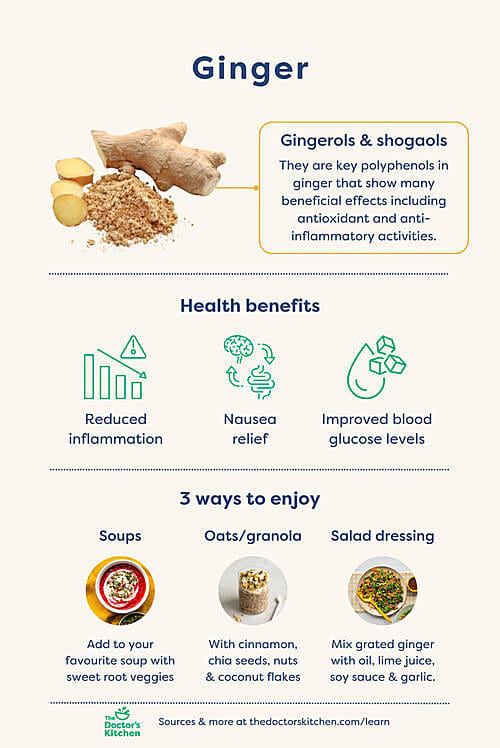Ginger: Benefits for nausea & pain
22nd Feb 2024
Ginger has been loved for centuries for its flavour and health benefits, including easing nausea, reducing inflammation and relieving period pain. We love it fresh in teas, soups and stews!
Key points
In a nutshell

5 health benefits of ginger
1. Nausea relief
It's one of the best-known remedies for nausea. Trials show that just 1 to 1.5g a day can help with nausea from pregnancy, chemotherapy and motion sickness, possibly by helping move food through the digestive system.
2. Glucose control
In people with type 2 diabetes, ginger extract lowers fasting blood sugar and levels of HbA1C. It might work by encouraging muscles to absorb glucose without needing extra insulin.
3. Lower inflammation
Clinical trials show ginger can reduce inflammation markers like CRP and IL-6, offering potential for managing chronic inflammation.
4. Pain relief
Up to 2 grams daily during the first three days of menstruation might help ease period pain as effectively as painkillers like ibuprofen, according to a 2022 review. It might also ease arthritis pain, but more studies are needed to confirm this.
5. Viral infections
One small study found that COVID-19 patients taking 1.5g of ginger twice daily recovered faster, spending two fewer days in hospital on averagewhich was attributed to ginger’s broad anti-inflammatory properties. While promising, it’s just one study, and more research is needed to confirm these effects.
Key compounds
The benefits of ginger lie in its active polyphenols, mainly gingerols and shogaols. They contribute to its beneficial properties and characteristic flavour.
How much do you need?
Doses ranged from 1 to 3g per day. The equivalent of 1 gram of ginger is approximately:
- ½ teaspoon of powdered ginger
- 1 teaspoon of freshly grated raw ginger
Fresh, dried or cooked?
Fresh ginger is higher in gingerols, dried has more shogaols and cooking ginger creates zingerone – all of which offer unique benefits. Mix it up!
Are supplements worth it?
While most studies use dried ginger capsules for convenience, we recommend using it fresh or as a spice for a few reasons:
- Better flavour & more reliable – Fresh ginger adds a vibrant, zesty flavour to your meals and drinks and you know exactly what you're getting without any hidden ingredients.
- Regulation issues – The supplement industry isn’t well-regulated, so it can be hard to trust the quality, dose and ingredients in commercially available pills.
- Whole food effect – Using the whole root means you’re getting a full spectrum of benefits, not just one isolated compound.
How to enjoy ginger
Ginger’s slightly spicy, warming flavour is great in many dishes:
- Ginger tea – Grate or slice fresh ginger and simmer it with hot water. Add cinnamon or other spices for extra flavour and benefits.
- Soups & stews, especially with sweet root vegetables like carrots and squash.
- Salad dressing – Add finely grated ginger to a mix of olive oil, lime juice, soy sauce and garlic to jazz up any salad.
- Sauerkraut with red cabbage, grated carrots and apple.
- Porridge & granola – Add grated ginger to oats, flax seeds, cinnamon, nuts and fruits.
